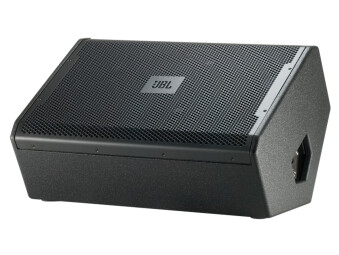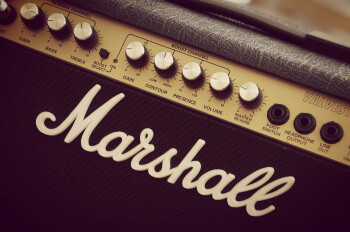Many factors can negatively impact your band’s sound, from lack of rehearsal to bad acoustics to feedback to malfunctioning gear to burnt-out sound engineers. But perhaps the most consistent impediment to sounding good is excessive stage volume. Yes, we all like to let it rip onstage, but by allowing our levels to get out of control, we can ruin it for the rest of the band and the audience.
Chain reaction
Often, volume problems begin during soundcheck, when singers insist on maxing out the monitors to the verge of feedback, thus creating a loud stage level that everyone must turn up to match. As mentioned in our three-part series on in-ear monitors, too much monitor volume, especially in a small-to-medium venue will bleed off the stage into the house, and muddy the sound. The monitors and mains are setup in different parts of the room from each other, and thus by the time the sound from the monitors gets to the ears of the audience, it’s slightly delayed from the sound waves coming from the mains, causing it to be out of phase, and therefore less distinct.

Adding to this is that unlike the mains, the monitors are turned away from the audience. So if the audience is hearing the monitors significantly bleeding into the house, much of what they’re hearing is coming to them indirectly as reflections, and therefore even more delayed and out of phase.
But the fault doesn’t lie only with the singers. It’s kind of a “chicken or egg?” situation. Singers often require louder monitors because the band is cranked up so loud. If drummers, guitarists, keyboardists and bass players (or any other musician onstage for that matter), aren’t cognizant of their volume, and of trying to keep it at a reasonable level, they’re just as guilty of causing the volume escalation as the singers.
If the stage volume gets too loud, two things can happen: A sound person mixing from the front of house will need to turn up vocals and instruments in the mains in order to make the mix sound right, and the sound in the venue can get uncomfortably loud. If there is no sound person, than the roar from the stage could likely mess up the mix that was set at soundcheck, resulting in vocals or particular instruments not being heard.
Solutions
Keeping a band from getting too loud is not easy, but with that goal in mind, the most important hurdle the band must get over is a mental one. All band members must buy into the concept that the collective sound is what counts. Otherwise, if everyone is out for themselves, volume wise, and the result will be the aforementioned escalation. If you can get away from that dynamic, and convince the band members to be aware of how their volume affects everyone else’s and the band’s sound level as a whole, then musicians will be ready to compromise, which is key.

Such compromises include singers learning to live with less monitor volume, drummers agreeing to play more quietly (or maybe even with blasticks or brushes, depending on the genre), and guitarists and other musicians with amps being willing to turn themselves down.
One way to make this more likely to happen is if you can put the instruments through the P.A. along with the vocals, and leave it to the sound person to make adjustments in the mains where necessary. In this scenario, stage amps become more like monitors — they let the musicians hear themselves without having to be loud enough to cover the entire venue. I’ve even seen bands set up with the guitar amps facing the musicians, rather than the audience, so that they’re truly functioning just as monitors. That solution may be a bit extreme, but in a large venue with a good sound person, it can be an effective strategy.
If you don’t have a sound person, but do have the ability to mic or DI all the instruments, you’ll need to do a really careful soundcheck so that you are able to get a basic mix dialed in for the band. During the set, musicians who need to turn up and down (for example a guitarist who plays rhythm and lead) will have to control those changes themselves — again, with the mindset of not blowing everyone else away with their volume.
Over the course of your show, the sound level is likely to start creeping up, no matter how careful you are. If the FOH engineer or people you trust out front are telling that you’re getting too loud, the whole band should be amenable to turning down or playing softer (in the case of drums), if need be.
Do try this at home
One way to keep stage sound down is to get used to playing more quietly, which can be done at rehearsal. A good excercise is to try practicing at such a low volume that the vocalists don’t need to use their mics, or can turn them way down. For some really loud genres, this might be tough, but even a rock band can do it if they try.
The drummer will have to play very quietly during this excercise, or consider using the stick alternates mentioned earlier, and everyone else will have to turn way down, but if you can spend at least some of the rehearsal playing at reduced volume, you’ll get more used to playing quieter onstage. It’s also a good way to get the band to appreciate the importance of dynamics, because they’ll hear the volume differences between song parts a lot more clearly at low volume. You might get grumbles when you suggest this idea, but once your band mates try it, they may very well say, “Wow, I can finally hear all the parts.”
Conclusion
Even a great band can be sabotaged by sound issues. Lousy acoustics, inferior P.A. gear and incompetent sound engineers cause bands enough sonic troubles as it is. Excessive stage volume will only compound any sound problems you’re having, so if you can keep things under control, the odds of your audience hearing a good mix will be greatly increased.


